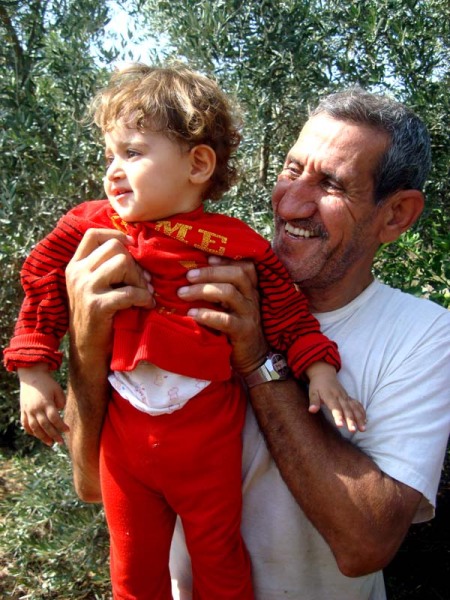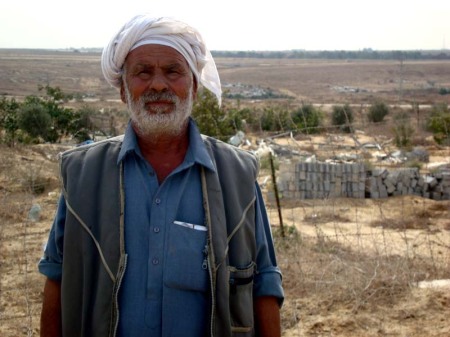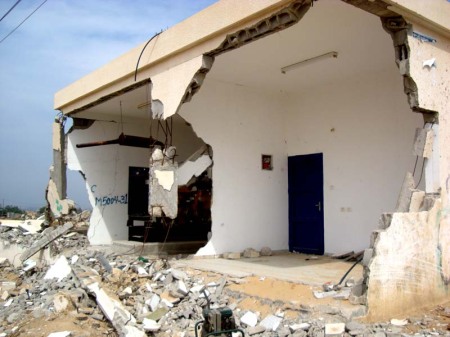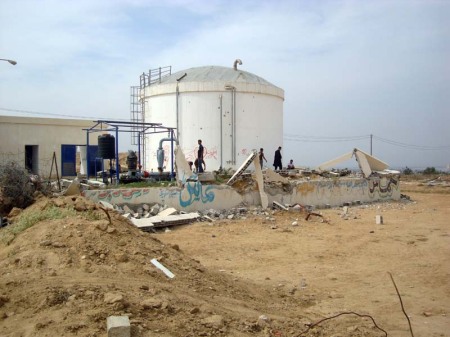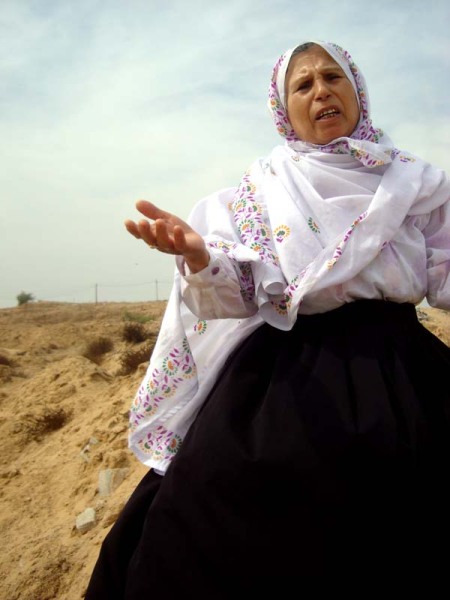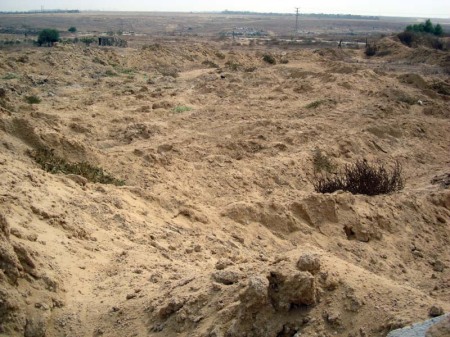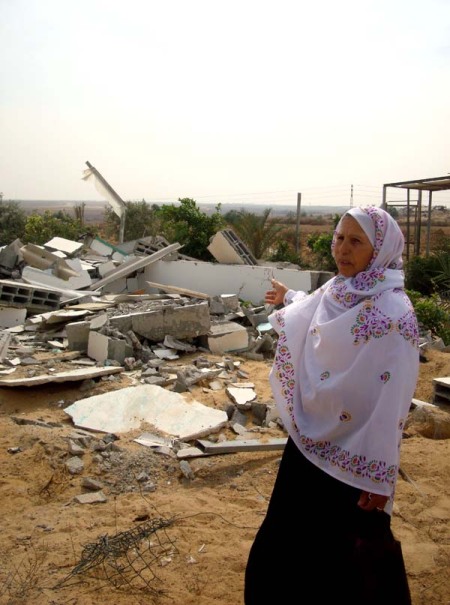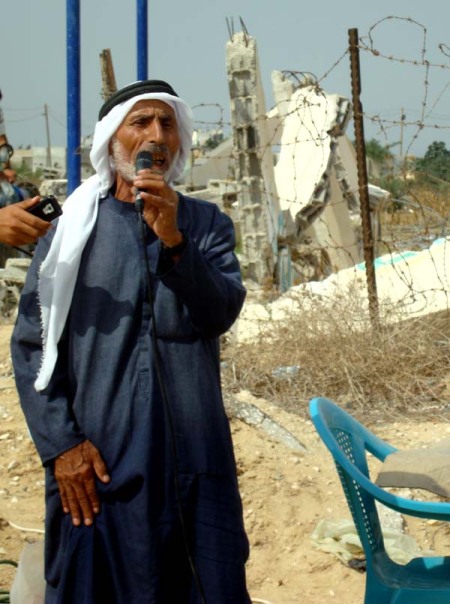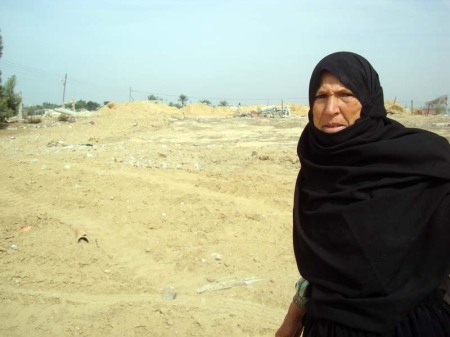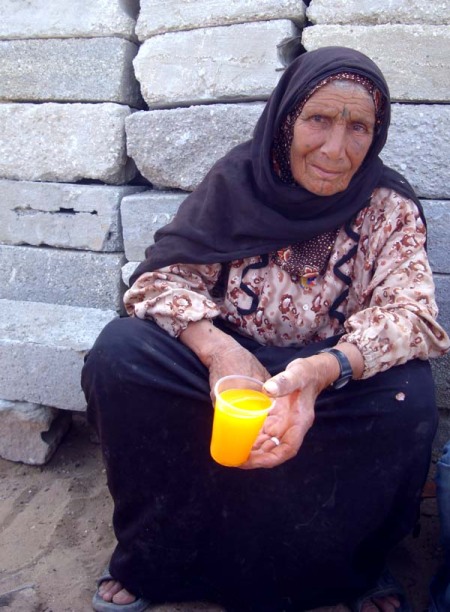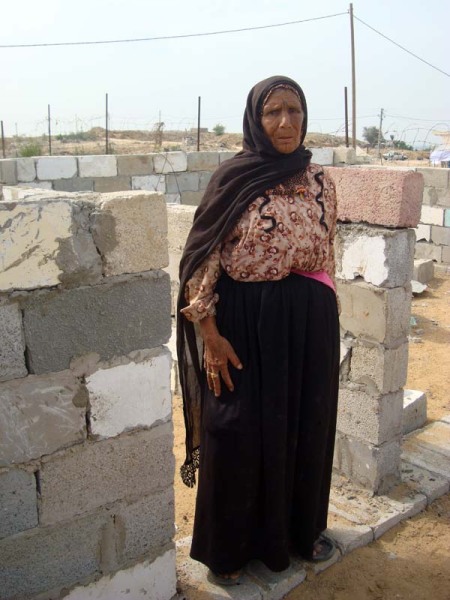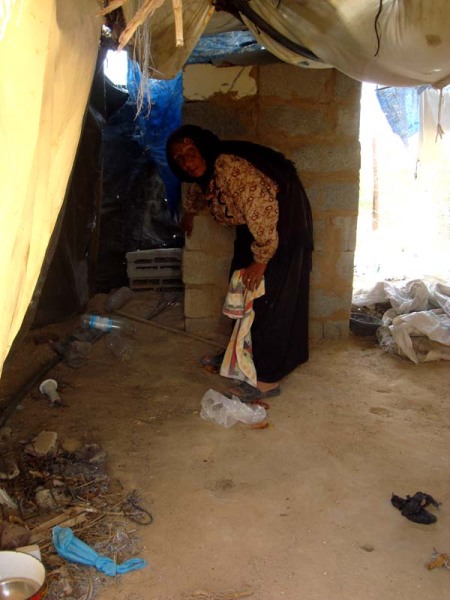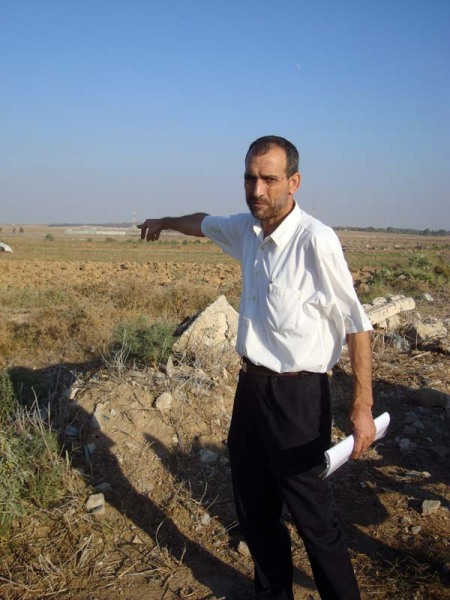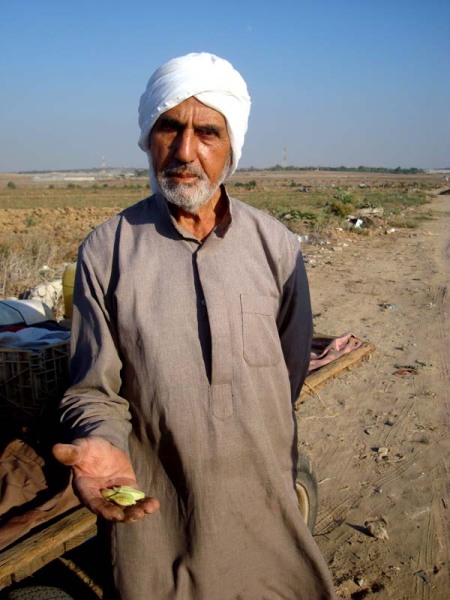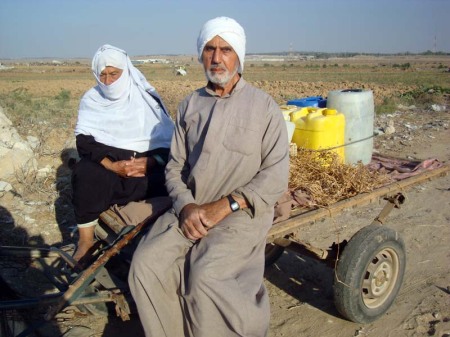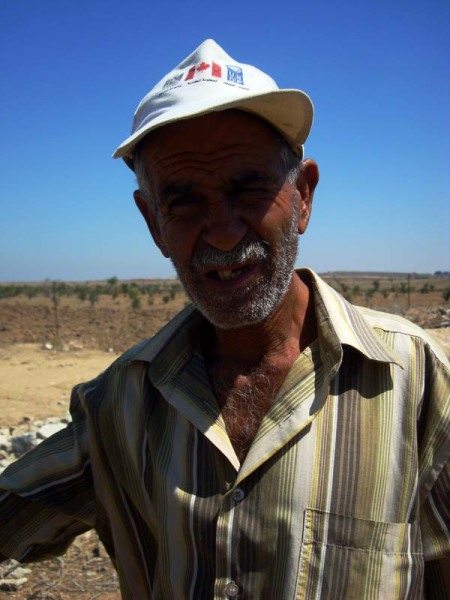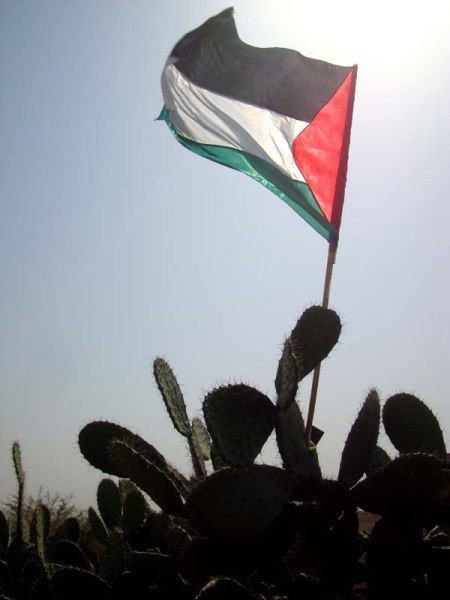October 19, 2009
Israel kidnaps Palestinian journalist in Al-Khalil
October 19, 2009
AL-KHALIL, Israeli occupation forces (IOF) kidnapped Palestinian journalist Iyad Sorour from Al-Khalil city, in the south of the West Bank on Sunday, only one month after his release from the Palestinian Authority’s jails.
The forum of Palestinian journalists said in a press release that a large number of IOF troops stormed the house of Sorour in the city and took him to an unknown destination.
The forum affirmed that Sorour spent 10 months in the PA intelligence’s jail and was released a month ago, adding that he was detained for 14 months in Israeli jails in 2002.
The forum appealed to the international federation of journalists, the organization of reporters without borders and the union of Arab journalists to intervene and pressure Israel to immediately release all journalists in its jails.
It also called on Mahmoud Abbas to instruct his militias in the West Bank to release journalists detained in his jails and end restrictions imposed on their freedom.
Nine other Palestinian citizens have also been kidnapped at dawn Monday during raids carried out by IOF troops on homes in different West Bank areas.
The lawyer of the Palestinian prisoners' society also reported Sunday that the Ofer prison administration imposed a number of punitive measures on Palestinian prisoners in section nine under the pretext of tampering with the section’s door lock, the allegation was denied by prisoners.
The lawyer added that the prison administration deprived prisoners of visits and the canteen for one month and a half as of 18 October.
He also said that the prisoners complained about the Red Cross’s neglect of their needs, saying that they did not receive yet what they asked the Red Cross representatives to bring with them, including books and clothes, because they had not visited the prison for four months.
Source
U.K. Professors Warn Government Not to Subsidize Nuclear Power

By Catherine Airlie
Oct. 19 (Bloomberg) -- U.K. professors from Imperial College, Sussex University and University of Greenwich will advise the government against subsidizing or fixing prices for new sources of nuclear power.
“If the government caves in to nuclear industry demands for subsidies and guarantees, it will be electricity consumers and taxpayers that will pay huge additional costs,” Steve Thomas, professor of energy policy at the University of Greenwich, said today in an e-mailed statement.
The academics are scheduled to present their views before U.K. lawmakers, policy advisers and nuclear industry executives today. Any subsidies for new nuclear power stations could lead to legal challenges under European Union competition law, the professors said.
UN: Israeli Spy Devices Responsible for Lebanon Blasts
Israel Says Explosions Prove Hezbollah Violating Ceasefire
A string of explosions in Lebanese territory near the Israeli border this weekend have been investigated by the United Nations, and found to have been caused by the detonation of spying devices planted by the Israeli military following the 2006 war.
Planting such devices would be a flagrant violation of the resolution 1701 ceasefire agreement which ended the conflict, but while Israel declined to comment on the nature of the devices they said their discovery proved that Hezbollah was actually violating the deal. They also claimed that the UN report was part of a Hezbollah plot to distract attention from their violation.
The devices were reportedly discovered by the Lebanese military, and were detonated, apparently remotely. No one appears to have been injured in the blasts.
Lebanon’s Prime Minister Fouad Saniora slammed the devices as a violation of the ceasefire, but they weren’t even the only Israeli violation that day. The UN peacekeepers reported Israeli drones entered Lebanese airspace, and there were reports that the Lebanese military fired on the drones as they overflew a garrison.
Israel negotiates to import water from Turkey
 |
to import water from Turkey, amid worries over its dwindling local reserves.
Israel's Foreign Ministry, which is tasked with conducting the negotiations, had held talks with Ankara on the subject in 2000-2006 but finally abandoned the idea because of high costs as well as technical problems, Jerusalem Post reported Monday.
The current round of talks comes at a time when Israel's national carrier ElAl has declared that his employee association and those of several other major Israeli businesses plan to stop subsidizing vacations for their workers to Turkey.
A large Israeli cafe chain has also decided to stop selling Turkish coffee.
Ties between Israel and Turkey began to sour in January when Ankara strongly condemned Israel's 22-day offensive on the Gaza Strip, which killed at least 1400 people mostly woman and children.
Relations took another sharp downturn when Turkey excluded Israel from a recent joint air force drill due to the Gaza incident.
ElBaradei: Iran’s Nuclear ‘Threat’ Exaggerated
Greatest Danger Comes From Possible Israeli Attack on Iran
By JASON DITZ - October 18, 2009In an interview with the German-language Die Presse, IAEA chief Mohamed ElBaradei cautioned that the threat of Iran acquiring a nuclear weapon was dramatically over-stated.
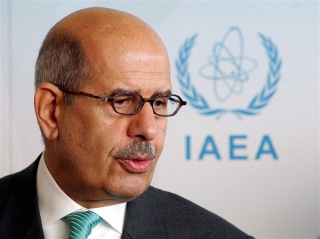
The greater threat to the region, ElBaradei insisted, was the possibility that Israel might some day make good on its long-standing threats and launch an attack on Iran. This, he said “would turn the entire region into a fireball.”
ElBaradei finished the interview with another appeal to turn the Middle East into a nuclear free zone, and insisted that Israel’s status as a non-signatory of the Non-Proliferation Treaty was the source of the regional imbalance.
Israel and the United States have insisted that Iran is attempting to create nuclear weapons, despite ample evidence to the contrary. The IAEA has continued to certify that none of its nuclear material has been diverted to any non-civilian purpose.
SourceOctober 18, 2009
Dignified beyond losses
*Mahmoud Musleh: “I’ve had three main things destroyed by Israeli forces: a tile factory on Sikka street (northern Beit Hanoun), another tile factory on Salah el Din street (Beit Hanoun), and the water well on my land. My olive trees have been bulldozed many times by Israeli forces. I’m 70 years old and now I have nothing, like when I was 16.”
*Mohammed Zaneen [eastern Beit Hanoun]: “I had 11 dunams of olive trees, bulldozed by the Israeli army. I used to earn well over US$11,000 from the olives. Now my oldest trees are just 4 years old and produce only a meagre amount. We also have bees. When there were many olive, lemon and orange trees, the bees produced quality honey twice per year. Now, we have to supplement the bees’ diet with sugar; they produce honey just once per year.”
*Abdullah Abu Shar, Waddi Salqa (central eastern Gaza): “During the Israeli war on Gaza, my house and 50 other homes from our extended family were destroyed by the Israeli army. My son Mahmoud (25) and his wife Fida (18) were killed with their son Tamer (10 months) by two Israeli drone missile attacks on their home.” [He later adds, "we have 4 martyrs in our family, bas (only)." "That's too many," I say. His stoic face crumbles and he sobs silently for a moment.]
*the water tank and pump, sending water to 150,000 residents, was destroyed in the Israeli attacks. It was out of use for 2 months. It has been re-built 4 times over the last 10 years.
*Masiouna Abu Shar: “I lived here for 50 years. This was my grandfather’s land. The Israelis destroyed everything. Not a single house was left. All the land destroyed. All of us now have to rent homes in Deir el Balah. $150 per month. The land is so torn up you can’t farm it any longer. What can we do with this land?”
“This was our house. Nothing is left. We had 50 trees, too: olives, figs, guava… all destroyed. See those houses over there? Destroyed, everything gone, all from our family.”
*Abdul-Raziq Abu Shar: “Three times the Israelis have bulldozed my olive trees in the last 7 years: in 2002, 2004, and 2005. I had 120 olive trees, and another 100 date trees. 15 of which were over 30 years old.”
“Thank you very much, thank you for listening.”
*Nayfa Abu Shar: “My house was destroyed, along with all my trees.”
*Ghrelli Abu Shar: “I lived with my son and his 4 children. Our house was destroyed. So were our 80 trees: we had figs, olives, lemons and dates.”
“We’ve made a small two room shelter with some of the stones we retrieved, but it’s not complete. When I come here during the day, I use this tent for shade, make food over a fire. I’m afraid to stay past sunset; the Israeli soldiers are always shooting at us here.”
*Sabri Jendiya (74), Shayjayee, eastern Gaza: “I’ve worked our land since I was a boy. We’re farmers, we put all of our investment into our land. We have 30 dunams (30,000 square metres) about 800m from the border fence.Because of the danger from Israeli soldier shooting, I don’t work my land like I used. Also, all the water sources were destroyed by the Israeli war on Gaza. When it rains, I will plant simple vegetables. There are 30 people in our house and only one of my sons has work.”
*Shabaan Mohammed Mhayssy (83): “I was so happy on my 7.5 dunams of land. I spent 10,000 shekels (~$2,500) to make our water cistern with a pump for watering the land. My olive trees were very old. The cistern and all of my trees have been destroyed by Israeli soldiers. I can’t feed the 30 people in our house.”
*Samir: “My land has been bulldozed 7 times. This area had maybe 100 olive and orange trees. There were 6 wells. All have been destroyed. When farmers were producing their own food, they were able to live self-sufficiently. Now they are run-off their land by Israeli attacks and are dependent on aid.”
*Ramzi Hillis: “I have good land, 20 dunams (20,000 square metres) about 400m from the border fence. All the trees and my 10,000 chickens have been bulldozed and destroyed, from 2004 until now. We still keep bees, though the honey production is very poor these years. I work as a taxi driver now to help support the 13 people in my family.”
*Amar Mhayssy (78): “My wife and I have 9 dunams (9,000 square metres) of land in the buffer zone. We can’t use the land because the Israelis will shoot us. We have 10 dunams of land over 500m from the border fence. Of that, we had 2 dunams of olive trees, over 60 years old. They were all bulldozed by the Israeli army. We will re-plant, and pray to Allah that the trees are not again bulldozed. We’ve got 13 people in our family, with 4 children in university. None of us has employment.”
*Amar Mhayssy and Sena Mhayssy (75): “Every morning the Israeli soldiers shoot at us. It’s a hard life here.”
*Salem As Saede. eastern Beit Hanoun: “I had 4.5 dunams of land, with olive and orange trees; it has all been destroyed by Israeli soldiers in recent years” During the winter Israeli massacre of Gaza, Israeli soldiers finished off his land and once again destroyed his water well. Married twice, Saede has 17 children, non employed. All are dependent on food aid. He cannot even work his land to provide fresh produce. Formerly, Saede was a school teacher.
UK Gov. Spies on ‘Innocent Muslims’
Excerpt
October 18, 2009
A British spying program targeting thoughts & beliefs of innocent people |
The information being gathered by the UK authorities includes, says The Guardian according to documents it says it has seen, political and religious views, information on mental health, sexual activity and associates, and other sensitive information.
As The Guardian’s editorial observes regarding the collection of this data:
“It hardly needs saying that it would be incredibly dangerous if innocent Muslims were to come to believe that [divide and rule] tricks were now being deployed against them, whether through the recruitment of agents or overt spying operations. Yet when, as we report, the authorities are actively seeking information on sexual activities, this must surely be a risk. What use could such data have apart from blackmail? How is news of its collection to be explained, other than in terms of a desire to dominate?” (1)
Biggest Spying Program Shami Chakrabarti of Liberty, the human rights organization, responded to The Guardian’s revelations by voicing outrage that the government appeared to be engaged in:
"...the biggest domestic spying programme targeting the thoughts and beliefs of the innocent in Britain in modern times. It is information-gathering directed at the innocent and the spying is directed at people because of their religion, and not because of their behaviour." (2)
Sources:
At NYU, devilish Shlomo Sand predicts the Jewish past and pastes the Zionists
by Philip Weiss on October 17, 2009
Of all the events I’ve covered surrounding Jewish identity and Israel in the last year, none has given me so much pleasure as the lecture last night by Shlomo Sand at NYU on the Invention of the Jewish People. Most events I go to are grinding, awful, heartrending, often with lamentations and pictures of mutilated children. This one was pure intellectual deviltry of the highest order by a Pavarotti of the lecture hall. And while it was fiercely anti-Zionist and included references to the mutilated children, it left me in just an incredibly elated mood. For I saw real light at the end of the tunnel, and not the horrifying dimness that surrounds almost all other events that deal with Israel politics here– for instance with the neoconservative Weekly Standard’s disgusting pursuit of J Street.
This pleasure was entirely Shlomo Sand’s achievement. He walked by me going down to the lectern and I noticed his physical vanity at once. He had expensive shoes on, designer jeans or cords, a zipup black jacket and a black shirt under that unbuttoned to the sternum. He is lean and mid-60sish, and behaves like a player. His beard is cut in an interesting manner, he wears designer glasses. I wondered if he dyed his hair. All glorious devil.
Sand has an excitable, self-referential style, and he began the lecture by breaking his guitar. “Jewish history is not my field.” No, but once he had discovered that the story of the connection of the Jewish people to the Holy Land was a myth, he decided that he would secretly explore the history but not publish until he got tenure for doing other work. Because if he published this first, “there would not be any chance of being a full professor. Not only in Tel Aviv. But at NYU too.”
Everyone laughed, but Sand said, “That is not a joke. I must write the book after I see that no one could touch me really.” More devil. Though Sand is right. This is no joke.
Sand studies European history, but Israel has a separate department in every school for Jewish history, and Zionists run these departments. “I have not a right to write about Jewishness.” The Zionist history holds that the Jews have an ancient connection biblically to the land, and were exiled from the Middle East in 70 AD, in what became the Diaspora. The Jews of New York and Warsaw. Sand began to question this story when he saw archaeologists’ work about the early Christian times and also when he saw scientific data. The exile is absurd. The Romans persecuted the Jews. They didn’t exile them.
At this point came the first interruption by a Zionist. A bald man in the third row or so called out, “What about Bar Kochba?” And: the Jews weren’t exiled because they were killed.
Sand seemed to live for this interruption. He walked up to the audience with his eyes gleaming, and congratulated the man for his knowledge of the Bar Kochba revolt of 135 AD, after the Second Temple destruction, and agreed with him, but also dismissed him. Yes many Jews were killed. And for the rest of the lecture Sand would dance toward this man and tease him that he was Jewish—he was—and urge him to buy the book to discover the gaps in his knowledge, or by the end of the lecture, say that he would buy the book for him himself, to improve him. More deviltry.
Back to the exile myth. The expelled diasporic Jews went in a straight line north to Europe, made a right into the land between the Caspian and the Black Seas, Kazaria, and also north to Russia and Poland; and when they got there in the 1800s they made a u-turn and started back to Palestine. The absurdity of the myth is that there were always Jews in the Middle East. The Jews were peasants and mingled with other populations. The Jews were not passive actors. They were at times a majority in the Holy Land and conquerors of the Arabian peninsula before the Arabs, and of North Africa too. For a time, they did not have a bar against proselytization. The Maccabees were the first to undertake forced conversion. In the 8th century the Jews and the Muslim Berbers were likely the invaders of Spain.
Sand offered very little by way of evidence. You will find that in his “boring” book, he said. This was an aria not a chalktalk. The Jews of the Middle East made several kingdoms over the years. One in Yemen, another in Babylon, another in North Africa, where they fought the Arabs. Sand said he loves the curly hair of the Yemenite Jews. More deviltry, with some concupiscence thrown in.
The Ashkenazi Jews of Eastern Europe originated in Kazaria. They were hugely successful and founded a great city, Kiev. We can claim to have founded Kiev, but not Jerusalem, he said. Because the Jews who lived in the Holy Land stayed in the Holy Land. Many of the people we now call Palestinians were originally Jews. The chance that someone who lives in Hebron today and speaks Arabic is a direct descendant of a Jew in ancient times is 1000 times greater than the possibility that I am descended from a Jew, Shlomo Sand declared.
Let’s move on from the mythology to the issue of national identity. Identity is formed by many many associations. “I don’t deny Jewish identity. I’m not fighting against someone’s identity. There is identity of homosexuals. They are not a people. We are composed of a lot of identities.” Two Catholic share a religious identity, but again, that is not a national identity with a tie to land.
Nationalism took root in human political development in the 1800s. The Germans and French began the project by inventing the idea of a German and French people. The French history books declared outright in the first sentence that the Gauls were their ancestors. It was a way to valorize the nation state, which was an essential part of modernity.
What is a people? A people generally shares a way of life, a language, a food, a geography. There is no Jewish language. Shlomo Sand stumbles proudly in English, while of course many of the people in the audience were Jews speaking English. Food the Israelis have–stolen from the Palestinians—and still you must say that there is an Israeli people. But they are not the Jewish people. They are Israeli people, and the Palestinians are Palestinian people. Both made by Zionism.
The Zionist project began inventing the idea of a Jewish people in the 1870s as a reflection of other nationalisms. The Zionists turned to the Bible for the foundational myth. The biblical myths are taught in Israeli schools from before children are taught mathematics and language–taught about the biblical associations of Jews to this land. But the Exodus is a complete myth. “As a historian, I try and predict the past. I’m not a prophet.” And what are the true predictions of the past: at the supposed time of the Exodus, the Egyptians also controlled Canaan. The kingdom of David and Solomon was not a kingdom at all, but a small settlement around Jerusalem.
Sand had run over his 45 minutes. In the Question and Answer period, his passion and intellectual majesty announced themselves. He sought to engage with the Zionists in the crowd, and did so out of moral fervor. When Sand said that Israel was not a democracy, and a Zionist called out, “It is a flawed democracy,” Sand bellowed. No: a democracy is founded on the idea that the people are the sovereign, that the people own the state. That is the first principle of a republic going back to Rousseau. Liberalism and civil rights are not the core. Yes, Israel is a liberal society. It tolerates Shlomo Sand’s heresy, for instance, and puts him on TV. But it is a liberal ethnocracy.
Down the row from me were two Arabs. I recognized the man from other events I have been to. I noticed how fulfilled they were by the talk, how quietly approving, and it was in this connection that we saw Sand’s passion: on behalf of the Palestinians. This part of the lecture brought tears to my eyes, it was so forceful and unapologetic. The idea that Joe Lieberman has a right to move to Israel tomorrow and a Palestinian whose ancestors have lived there for centuries cannot is an outrage, Sand said. But for 50 years the Palestinian Israelis were afraid to speak out.
“They were afraid because of the Nakba. They were afraid because of the military regime. Today this is a generation of young Palestinian Israelis that stop to be afraid. They become more anti-Israel in their politics the more they become Israelis.”
Ravishing fire.
Sand said that Gaza was just an intimation of the violence that might come when the Palestinians declare that they want a genuine democracy, a state of their own citizens in Palestinian-dominated Galilee. These are young Palestinian Israelis who don’t want to be part of the West Bank or of Gaza. They will be like the Kosovars of Serbia, who when the Serbs started to make an ethnic regime of the former Yugoslavia, did not want to be part of Albania, with whom they share religious connections, no they wanted to be their own country. (And got it, by the way, 60 years after the world falsely promised the Palestinians that they could have a state.) “They will build in Galilee a state of their citizens. That will start to be the end of Israel. Israel won’t let Galilee become a state of its citizens. It will be a mass murder, I’m afraid.”
Don’t we want to get past the idea of the nation-state? Of course we do, Sand said, but that is the era we are in. And tell that to the Palestinians. They want a state. Sand is for the two-state solution because the Palestinians ought to get a state after being denied it forever. As soon as the occupation, which has denied these Palestinians any civil or human rights for 42 years—more fire!—is ended, that is the day we throw ourselves into the project of making a confederation of Israel with Palestine and Jordan. The one-state solution is a utopia. “Utopia has to direct politics. Not replace politics. It’s too dangerous.” (Something like Hussein Ibish’s new book in that.)
When Sand spoke to Palestinian professors at Al Quds University, they told him to speak Hebrew, because they had all learned Hebrew in Israeli jails. And he told them that just because Israel had begun with a great crime did not mean that it had not begun. “Even a child that was born from a rape has a right to live. ’48 was a rape. But something happened in history. We have to correct and repair a lot of things.” The next day the Palestinian papers had his rape line in big headlines.
You have not talked about anti-Semitism, or self-hatred, said another Zionist, with a cap on. “I am anti-racist. And an anti-anti-semite,” he said. “But look at me, do you think I hate the Jewish?” More devil eyes flashing. “I don’t hate myself… I hate the Jewish people? But that doesn’t exist. How can I hate something that doesn’t exist?”
More Zionist claptrap from the claque: You say that a Jew can’t marry non-Jews in Israel, but two men can’t marry each other in this country! Sand laughed. Men should be able to marry each other here if they want to, and anyone should be able to marry anyone else in Israel. Why won’t the state recognize such marriages? Not because of the orthodox. No: the secular Jews gave the rabbis the power over marriage when they founded the Jewish state in ’48. They did so because “they were not sure of their identity, and needed religious criteria.”
What do you think of Israel Shahak, whose work says that ethnocentrism and chauvinism are built into the Jewish religion? Sand said that Shahak was a chemist and a man of tremendous moral force, but he didn’t know the material. (I say he’s right about this; all religious doctrines are interlarded with racism.)
Why are you not on Charlie Rose? asked a man with a beard. The man said, I watch Charlie Rose every night and I’m up to here with the Zionism on the show. He held his hand at his neck. Not just the Israelis, the American journalists who imbibe Zionism. Sand didn’t seem to know who Charlie Rose was. He has been on lots of Israeli TV shows. And been 19 weeks on the bestseller list in Israel. “Also in France.”
I thought, Why has Yivo not asked Sand to debate Michael Walzer? Two years back at Yivo/the Center for Jewish History, Walzer declared that the Jews are a people, a people like no other, without national borders. They have maintained a political community for 2000 years without geographical sovereignty, through a religious-legal structure. Interesting ideas. And it would be a fabulous debate. Where are you chickenshit Yivo, when these great ideas are bursting forth from the Jews who hate what Israel is doing to our identity?
I hope I am conveying something of the power of this event, and its incredible optimism and second sight. Sand challenged every Jew in the room to reimagine the future. “Most of the Jews [in the world today] are a product of conversion… I see the shame. And it is a shame. If you are born in the 20th century, and we were all born in the 20th century– to base your identity on biology.”
I thought as always of the American Jewish project: to end the Israel lobby and to end the myth of Jewish outsiderness. Sand had addressed this too. “The destiny of Israel. And the destiny of the Middle East depnds a lot on you, Americans.” This was a subject for its own lecture. But it was necessary for the Americans now to “save us from ourselves. I’m not joking about this.”
Do you fear for your life? someone asked.
“I’m worried in New York. Not in Tel Aviv. It’s not a joke. Really, I’m not joking.”
Suspected Israeli spy devices blown up in Lebanon
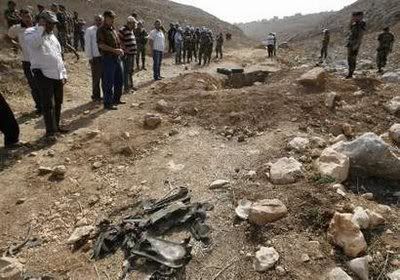
Members of the Lebanese army and U.N. peacekeepers inspect the site of an explosion between the villages of Meis al-Jabal and Houla in south Lebanon October 18, 2009. REUTERS/Ali Hashisho
AFP - October 18, 2009
BEIRUT — Three suspected Israeli spy devices have been blown up in south Lebanon, two detonated remotely by the Israeli army and one destroyed by the Lebanese army, a military official said on Sunday.
"One explosion occurred before midnight (2100 GMT) in a hilly part of the Hula border zone and a second happened in the same district (on Sunday) morning," the official told AFP.
It "seems the two detonations were triggered by Israel which exploded two spying devices it had planted in the sector a long while ago," she said.
Israel "feared for one reason or another that they might be discovered and proceeded to destroy them by exploding them remotely," the official said.
Lebanese troops "located another device and exploded it on Sunday morning" after going to the area on Saturday night with UNIFIL peacekeepers, she added.
A security official in south Lebanon told AFP the devices were used for "surveillance of communications by the resistance," referring to the Shiite Hezbollah movement which fought a bloody 34-day war with Israeli in 2006 that devastated the south of the country.
Yasmina Bouziane, spokeswoman for the UN peacekeeping force, confirmed that UNIFIL troops had deployed in the area but said she had no "detailed information about what happened."
The military official also said Lebanese anti-aircraft guns fired at an "Israeli MK-type reconnaissance aircraft which violated Lebanese air space, overflying the southern region of Bint Jbeil".
"The army fired because the aircraft was within range," she added.
Lebanon has repeatedly complained of violations of its air space by Israeli aircraft.
On October 12, a Lebanese man was wounded in a blast at a south Lebanon house occupied by a Hezbollah member.
Israel said the house was a Hezbollah arms depot but the militant group denied the claim and said a reaction between chemical products caused the explosion. Israel has protested to the UN Security Council.
The UN Security Council resolution, which brought an end to the 2006 conflict between Israel and Hezbollah, required the Jewish state to stop overflights of Lebanon.
Old Testament Brutalities
October 16, 2009
I decided I needed to do a refresher on basic Old Testament material. I reread the entire books of Leviticus and Deuteronomy. I doubt if many folks have read these two documents, but they are in the Bible, so they must be worthy of our attention.
The material is not unfamiliar to me, but I was jarred anew at the absurdity and the violence, that are contained in the two books. The Ten Commandments and commands to love God and neighbor are found in these writings, but they are not the central themes of the two books.
The first portion of Leviticus lays out detailed instructions about the slaying and burning of animals to appease and please God. Not exactly a topic of current interest.
If a sacrifice was properly executed, sins were forgiven and the odor of the burnt meat was pleasing to the nostrils of God. Other portions of Leviticus describe how priests practiced health care and what a woman must do to become “clean” after giving birth to a child.
The last chapters are known as “The Holiness Code” and describe the details of the life that is acceptable to God. Blasphemy is out. Sabbath keeping is in. Permanent ownership of land is out. Keeping feast days is in.
Slavery is in. Men lying with men is out. Adultery is out, as is incest. Loving your neighbor is in. Cloth woven with two different kinds of yarn is out. Tithing is demanded. Loaning money for interest is out. Eating pork is out.
Even the most ardent Fundamentalist picks and chooses what to embrace and what to reject from these ancient rules written hundreds of years after Moses and hundred of years before Jesus.
Deuteronomy has a different character. The book is a retelling of the basic Moses/Law story with an emphasis on the blessings of obedience to God’s law and the consequences of disobedience.
The Ten Commandments are repeated and the details of the righteous life are spelled out. Some items are redundant to Leviticus. Obedience to God’s laws is a big concern, and long passages lay out the consequences of disobedience.
In the 14th chapter the unbending nature of God’s law and the severity of punishment for disobedience are made plain.
“If your brother, or your son, or your daughter, or your wife, or your friend, who is as your own soul, entices you by saying ‘let us go and serve other Gods,’ you shall not yield to him or listen to him, but you shall kill him.
“You shall take the lead and the hand of all the people shall join you. You shall stone him to death because he sought to draw you away from the Lord your God.”
This is dangerous material in the hands of a religious Fundamentalist. And another example:
In the retelling of the story of the Israelites, the Deuteronomy writer reports that the conquering Israelites entered Palestine from the south, in obedience to the instructions of Jehovah God.
They “captured all the cities and utterly destroyed them and all men, women, and children. We left none remaining.”
This report of violent destruction is repeated and the violence was justified each time because they were taking land that had been given to them by God. Never mind that people had been living there for centuries.
As I read about the strange rituals of Leviticus and the harsh, seemingly senseless injustice and violence of Deuteronomy, I reacted strongly. This does not describe the moral and ethical life that I embrace as a follower of Jesus from Nazareth. [...]
In 2009, I have become wary of saying “The Lord’s Prayer” too many times, of singing “The Star Spangled Banner” too many times, of reciting creeds and confessions of faith too many times, of reciting the Pledge of Allegiance too many times.
I believe they deaden the very senses that are needed to make me a better Christian, a better American and a better contributor to a more just world. I cannot believe building a bigger, more effective military, that can lose fewer of us and kill more of them, is the answer to a safer world.
What should I read next? Revelation?
The Rev. Howard Bess is a retired American Baptist minister, who lives in Palmer, Alaska. His email address is hdbss@mtaonline.net.Source

